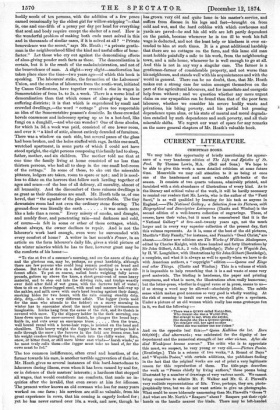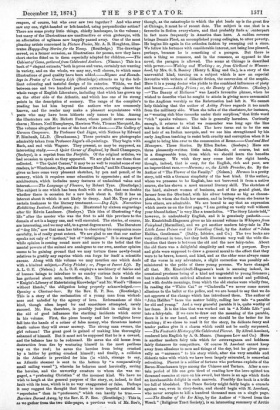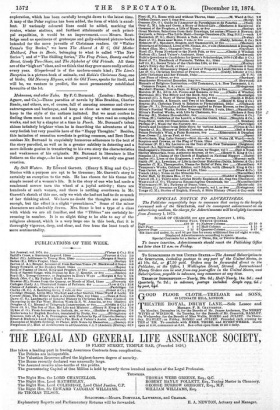CURRENT LITERATURE.
CHRISTMAS BOOKS.
We may take this opportunity of briefly mentioning the appear- ance of a very handsome edition of ne Life and Epistles of St. Paul. By Thomas Lewin, M.A. (Bell and Sons.) We hope to be able to give this work a more detailed criticism at some future time. Meanwhile we may call attention to it as being at once one of the handsomest and most valuable gift-books of the season. It consists of two quarto volumes, admirably printed, and furnished with a rich abundance of illustrations of every kind. As to the literary and critical value of the work, it will be hardly necessary to remind our readers that Mr. Lewin, who is the author of the " Faati Saul," is as well qualified by learning for his task as anyone in England.—The National Gallery; a Selection from its Pictures, with Biographical and Descriptive Letterpress (Chatto and Winans) is the second edition of a well-known collection of engravings. These, of course, have their value, but it must be remembered that it is the "National Gallery" of five-and-twenty years ago, not the much larger and in every way superior collection of the present day, that this volume represents. As it is, some of the best of the old pictures, Murillo's" Holy Family," for instance, and Francia's "Dead Christ," are absent —Other new editions are The Works of William Shakespeare, edited by Charles Knight, with three hundred and forty illustrations by Sir John Gilbert, A.R.A., 2 vols. (Routledge); Tales of a Wayside Inn, by H. W. Longfellow, with illustrations by Sir John Gilbert (Routledge), a complete, and what it is always as well to specify when we have to do with American authors, a " copyright " edition.—Queens and Kings and other Things. (Chatto and Winclus.) This is a volume of which it is impossible to help remarking that it is a sad waste of some very good materials. The binding is handsome, the paper and printing sumptuous, and what is more, the illustrations often really humorous; but the letter-press, whether in doggrel verse or in prose, seems to us— if so strong a word may be allowed—absolutely idiotic. The subtle sense which makes good nonsense so very good is wholly wanting. At the risk of seeming to insult our readers, we shall give a specimen. Under a picture of an old woman which really has some grotesque fun in it, we find the following :— “ There was a QUEEN called KALLI-BOO, Who dreamt she was a weintr-Poo, But strange to say, when she awoke, She thought she was a QUEEKI QUOKE ; Yet stranger still, her aged mother Vowed she was neither one nor Vother."
And on the opposite leaf this:—" Queen Kalliboo the 1st. Born 000,000i ; died afterwards ; was celebrated for the dignity of her deportment and the numerical strength of her other virtues. After she died Watzkipoos became scarcer." The critic who is to appreciate this must, we suspect, be very young or very old.—Picture Posies. (Routledge.) This is a reissue of two works, "A Round of Days" and "Wayside Posies," with certain additions, the publishers finding in the fact that the original works are out of print a very legitimate reason for this reiroduction of them. The title-page describes the work as "Poems chiefly by living authors," these poems being illustrated by a number of drawings of very various merit. We cannot bring ourselves to admire Mr. F. Walker and Mr. G. J. Pinwell's very realistic representations of life. True, perhaps, they are, photo- graphically true, but we do not want artists to give us photographs. What could be more hideously unmeaning than Mr. Pinwell's "Goose "? And what are Mr. North's "Reapers" about ? Reaners put their right hands on the handle nearest the blade. There may be left-handed reapers, of course, but who ever saw two together ? And who ever saw any one, right-handed or left-handed, using perpendicular action? There are some pretty little things, chiefly landscapes, in the volume ; but many of the illustrations are unattractive or even grotesque, with an affectation of ugliness now happily passed away. One of the most pleasing artists concerned in Picture Posies, Mr. A. B. Houghton, illus- trates Happy-Day Stories for the Young. (Routledge.) The drawings served, on a former occasion, as illustrations for poems, now they have short stories fitted on to them especially adapted for children.—The Cabinet of Gems, gathered from Celebrated Authors. (Nimmo.) This is a book of" elegant extracts," both in prose and verse, certainly not wanting in variety, and on the whole, we may say, well chosen, to which some illustrations of good quality have been added.—Rhymes and Rounde- lays in Praise of a Country Life (Routledge) attracts us by the bril- liant colouring and tasteful design of its exterior. Within, we find between one and two hundred poetical extracts, covering almost the whole range of English Literature, including that which has grown up on the other aide of the Atlantic, and which has one of its strong points in the description of scenery. The range of the compiler's reading has led him beyond the authors who are commonly known, and the reader may make a pleasant acquaintance with poets who may have been hitherto only names to him. Among the illustrators are Mr. Birkett Foster, whose pencil never ceases to charm ; Messrs. Noel Humphreys, Harrison Weir, Thomas 3lacquoid, &c. The volume altogether is one of the best of its class.—The Gallery of German Composers. By Professor Carl Jager, with Notices by Edward F. Rimbanit, LL.D. (Bruckmann.) These portraits are photographs admirably taken from Professor Jager's oil-paintings. They begin with Bach, and end with Wagner. They present, as may be supposed, an interesting study.---A Quiet Corner of England, by Basil Champneys, (Seeleys), is a reprint from the Portfolio. Of the original articles, we had occasion to speak as they appeared. We are glad to see them ante collected. "The Quiet Corner," it may be as well to remind some of our readers, is "Winchester, Rye, and the Romney Marsh," and Mr. Champneys gives us here some very pleasant sketches, by pen and pencil, of its scenery, which it requires some education to appreciate ; and of its architecture, which includes many features of undoubted value and interest.—The Language of Flowers, by Robert Tyas. (Routledge.) The subject is one which has been dealt with so often, that one doubts whether there is occasion for a new book about it. Still it has an interest about it which is not likely to decay. And Mr. Tyas gives a certain freshness to the literary treatment.—Dog Life. Narratives Exhibiting Instinct, Intelligence, 6-c. Illustrated by sixteen engravings after Sir Edwin Landseer. (Seeleys.) This idea of illustrating "dog life " after the master who was the first to add this province to the domain of art is a happy one, and well executed. The stories, of course, are interesting, and we may add, to a great degree novel. The literature of" dog life," now that man has taken to observing his companion more carefully, is of really great extent. We are glad to see that our author speaks not only of "instinct," but of "intelligence." It is strange that while opinion is coming round more and more to the belief that the mental powers of the animal are analogous to our own, another opinion seems to be gaining ground that we may torture these newly-found relatives to gratify any caprice which can forge for itself a scientific excuse. Along with this volume we may mention one which deals with a kindred subject,—Fairy Frisket ; or, Peeps at Insect Life. By A. L. 0. E. (Nelson.) A. L. 0. E. employs a machinery of fairies and of human beings to introduce to us sundry curious facts which she has gathered about ants, butterflies, &c. The book is founded on "Knight's Library of Entertaining Knowledge" and Mr. Wood's "Homes without Hands," the obligation being properly acknowledged.— Opening a Chestnut-burr. By the Rev. E. P. Roe. (Routledge.) This is a story of the reclamation of a young man from wicked- ness and unbelief by the agency of love. Reformations of this kind, though often hoped for and sometimes attempted, rarely succeed. Mr. Roe, therefore, is possibly justified in calling in to the aid of good influences the startling incidents which occur in his volume. First, the pious beauty and her irreligious lover fall into the hands of a coiner of false money, who threatens instant death unless they will swear secrosy. The strong man swears, the girl refuses ! The great good is gained of making him thoroughly ashamed of himself. But it must not be supposed that he is a coward, and the balance has to be redressed. He saves the old house from destruction from fire by venturing himself in the most perilous way on the roof ; he saves the heroine from being crushed by a ladder by getting crushed himself ; and finally, a collision in the Atlantic is provided for him (in which, strange to say, an Atlantic steamer is sent to the bottom by "a comparatively small sailing vessel "), wherein he behaves most heroically, saving the heroine, and the unworthy creature to whom she was en- gaged, a "professing Christian" of the meanest kind. We have no wish to laugh at the general purpose of the story, or, indeed, to find fault with its tone, which is in no way exaggerated or false. Perhaps it may suggest the thought that there is more hopeful material in "reprobates" than in "professors," which can hardly be true.— Barriers Burned Away, by the Rev. E. P. Roe. (Routledge.) This is as we gather from the two title-pages, a previous work of Mr. Roe's, though, as the catastrophe to which the plot leads up is the great fire at Chicago, it must be of recent date. The subject is one that is a favourite in fiction everywhere, and that probably finds a. ,anterpart in fact more frequently in America than here. A sudden reverse brings Dennis Fleet, an accomplished young collegian, to utter poverty. He begins life again in the orthodox fashion by sweeping out a store. We follow his fortunes with considerable interest, not being less pleased, perhaps, because he is something of a paragon. But there is such a thing as romance, and in the romance, as opposed to the novel, the paragon is allowed. The scene at Chicago is described with power.— Waking and Working ; or, from Girlhood to Woman- hood, by Mrs. G. S. Reaney (Henry S. King and Co.), is a story of the uneventful kind, turning on a subject which is now an especial favourite with writers of didactic fiction, the conversion of the sceptic. Here it is a young doctor who yields to the combined influences of piety and beauty.--Ashley Priors ; or, the Beauty of Holiness. (Mozley.) —" The Beauty of Holiness" was Laud's favourite phrase, when he wished to describe what ho sought to attain in giving more ceremonial to the Anglican worship as the Reformation had left it. We cannot help thinking that the author of Ashley Priors regards it too much from the millinery side. When she talks of the choristers, for instance, as "wearing rich blue cassocks under their surplices," that little word "rich" speaks volumes. The tale is generally harmless. Curiously enough, it returns to what we remember was long ago the line taken in fictions of this kind. The hero turns out to be the son and heir of an Italian marquis, and we see him strengthened by his early Anglican teaching to resist both cruelty and corruption when it is sought to bring him over to the communion of Rome.—Good and Bad Managers. Three Stories. By Ellen Barlee. (Seeleys.) Here are three pleasantly-written little tales, didactic, of course, but not in a disagreeable tone, from which we should learn the benefits of economy. We wish they may come into the right hands, though, indeed, that is easy, for the English, rich and poor, are an improvident race.—Herman; or, the Little Preacher, dm. By the Author of "The Flower of the Family." (Nelson.) Herman is a pretty story, told with a German simplicity of the best kind. If the author, whom we presume to be English, has not borrowed it from a native source, she has shown a most unusual literary skill. The sketches of the hard, stalwart woman of business, and of the genial giant, the farmer from the Oberland, with his silver buttons as big as cheese- plates, in whom she finds her master, and in loving whom she learns to love others, are admirable. We are bound to say that an expression which meets us on the first page, "I am getting on vastly well without your blessed father," is very like a translation. "The Story Lizzie told," however, is undoubtedly English, and it is genuinely pathetic.— Mr. Knatchbull-Hugessen gives us his annual volume in Whispers front Fairyland (Macmillan), and we get another modern fairy-tale in The Little Lame Prince and his Travelling Cloak, by the Author of "John Halifax, Gentleman." (Daldy, Iabister, and Co.) The two books are very different in tone, but they both illustrate very well the wide dis- tinction that there is between the old and the new fairy-tales. About the old there was a delightful simplicity and want of purpose. Boys. and girls were supposed to draw a general moral to the effect that they were to be brave, honest, and kind, and as the elder sons always came off the worse in any adventure, a slight correction was possibly ad- ministered to the pride of these young persons. We have changed all that. Mr. Knatchbull-Hugessen'a book is amusing indeed, its occasional prosiness being of a kind not ungrateful to young listeners ; but it abounds with satirical allusions to matters social and political, and with double meanings, from which the old stories were wholly free. In reading the "White Cat" or "Cinderella" we never come across allusions to the ballot or the police, and we are bound to say that we do. not approve of the change which has introduced them. The author of "John Halifax" faces the matter boldly, calling her tale "a parable for old and young." And a very graceful parable it is, quite worthy of her fame. It is the idea that was worked out in "A Noble Life " put into a fairy-tale. If we care to draw out the meaning of the parable, there it is to our hand, and every one should be the better for its. teaching ; if we chose to read it for the story, its delicate fancy and tender pathos give it a charm which could not be easily surpassed. —The Fantastic History of the Celebrated Pierrot. By Alfred Assolant, rendered into English by A. G. Munro. (Sampson Low and Co.) Here is another modern fairy tale which for extravaganza and boldness. fairly distances its competitors. Of course M. Assolant cannot keep away from allusions to men and things of the day, but he gives gene- rally an " unreason " to his story which, after the very sensible and didactic tales with which we have been largely saturated, is somewhat refreshing. Pierrot is a soldier of fortune who performs exploits of the Baron-Munchausen type among the Chinese and Tartars. After a cer- tain period of life one gets tired of reading how the hero spitted ton thousand enemies at once on his sword, but there is an age which finds an inexhaustible delight in such marvels. Possibly the book is a trifle too full of bloodshed. The Peace Society might fairly begin a crusade against war, even in story-books, and should begin with M. Aseolant, who never scruples to kill a hundred thousand men on a single page. —The Realms of the ice King, by the Anther of "Saved from the Wreck" (Religious Tract Society), is an interesting summary of Arctic
exploration, which has been carefully brought down t3 the latest time. Fleet (E. F.), Roses with and without Thorns, 16mo
A map of the Polar regions has been added, the form of which is excel- lent. If variously coloured lines could be added, marking the routes, winter stations, and furthest attainments of each princi- pal expedition, it would be an improvement.— Messrs. Rout- ledge send us specimens of grotesque and gaily-coloured picture-books intended for the more juvenile of Christmas readers. Of "Walter Crane's Toy Books," we have The Absurd A B C, Old Mother Hubbard, Puss in Boots, belonging to what is called "The Now Series "; and of "The Shilling Series," The Frog Prince, Beauty and the Beast, Goody Two-Shoes, and The Alphabet of Old Friends. All these are of the "high art "class, and we think that they grow more really artistic every year. Gingerbread is of the modern-comic kind ; The Lion's Reception is a picture-book of animals, and Robin's Christmas Song, one of birds; Old Nursery Rhymes, with the Old Tunes, speaks for itself, and will be, we venture to predict, the most permanently established favourite of the lot.








































 Previous page
Previous page